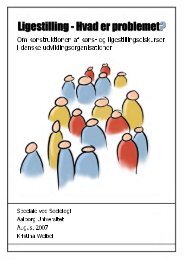KVINDER BRYDER GRÆNSER
KVINDER BRYDER GRÆNSER
KVINDER BRYDER GRÆNSER
You also want an ePaper? Increase the reach of your titles
YUMPU automatically turns print PDFs into web optimized ePapers that Google loves.
Metteskorr 10/02/05 15:04 Side 144<br />
144 KINGA LOHMANN<br />
NOTER<br />
1 Karat er en regional koalition af organisationer og enkeltpersoner, der kæmper for ligestilling og økonomisk retfærdighed i<br />
Central- og Østeuropa og i Samfundet af Uafhængige Stater (CEE/CIS). Den overvåger implementeringen af internationale aftaler og<br />
driver lobbyvirksomhed med henblik på varetagelse af kvindespecifikke interesser i regionen i forhold til besluttende myndigheder på<br />
alle niveauer. Det regionale netværk blev dannet som en reaktion på CEE/CIS-regionens usynlighed i det internationale samfund.<br />
Formelt blev Karat-koalitionen dannet af repræsentanter fra ti CEE-lande i Warszawa den 1. februar 1997. Den blev registreret som en<br />
international organisation i Polen i 2001. Medlemmerne af Karat indbefatter NGO’er fra 20 lande (Albanien, Armenien, Aserbajdsjan,<br />
Hviderusland, Bosnien & Hercegovina, Bulgarien, Kroatien, Tjekkiet, Georgien, Ungarn, Letland, Litauen, Makedonien, Moldova, Polen,<br />
Rumænien, Rusland, Serbien & Montenegro, Slovakiet og Ukraine). Siden oktober 1997 har Karat koncentreret sig om at overvåge, at<br />
CEE/CIS-landene overholder deres forpligtelser i henhold til FN’s Beijing-konference. Siden januar 2002 har den aktivt engageret sig i<br />
indlemmelsen i EU og den europæiske integration.<br />
2 Kuzmicz, 2004.<br />
3 Kapitlet er baseret på Lohmann, K., Seibert, A. (eds.), Gender assessment of the impact of European Union accession on the<br />
status of women in the labour market in Central and Eastern Europe. National study : Poland, 2003.<br />
LITTERATURLISTE<br />
Choluj, B., Neusuess, C. (2004): EU Enlargement in 2004. East-West priorities and perspectives from women inside and outside<br />
the EU. Warsaw-Berlin.<br />
Ciechocinska, M. (1993): “Gender aspects of dismantling the command economy in Eastern Europe: the case of Poland”. In Moghadan,<br />
V. (ed.): Democratic Reform and the Position of Women in Transitional Economies. Clarendon Press, Oxford.<br />
CSO (2002): Statistical Yearbook of Poland 2002. Central Statistical Office, Warszawa.<br />
CSO (2003): Labour Force Survey, IV quarter 2002. Central Statistical Office, Warszawa.<br />
Fodor, E., Glass, C., Kawachi, J., Popescu, L. (2002): Family policies and gender in Hungary, Poland, and Romania. Communist and<br />
Post-Communist Studies.<br />
Giza-Poleszczuk, A. (1992): Familism and system transformation. The Polish Sociological Bulletin 3/4.<br />
Institute of Labour and Social Affairs: http://www.ipiss.com.pl/english.html<br />
Karat Coalition: http://www.karat.org<br />
Karat Coalition (2003): Recommendations from the conference: “Gender Assessment of the Impact of EU Accession on Women and<br />
the Labour Market in Central and Eastern Europe”. Organized by Karat Coalition, Warsaw, November 7-9, 2003.<br />
Kotowska, I. E. (2002): Zmiany modelu rodziny. Polska – kraje europejskie. Polityka Spoleczna No 4.<br />
Kuzmicz, M. (2004): Bieda nam (nie) grozi. Gazeta Wyborcza, 24-25 April 2004.<br />
Lohmann, K., Seibert, A. (eds.) (2003): “Gender Assessment of the impact of EU Accession on the Status of women in the Labour<br />
Market”. In CEE. National Study: Poland. Karat Coalition. Warsaw.<br />
Muszynska, M. (2003): “Family models in Europe in the context of status of women”. In Working Papers on Population, Family and<br />
Welfare. Demographic Research Institute, Hungarian Central Statistical Office.<br />
NRO Frauenforum and Karat Coalition (2003): Expanding Rights, creating space for action? EU reform and enlargement from gender<br />
perspective. Position paper, Berlin.<br />
Paci, P. (2002): Gender in Transition. World Bank, Washington, D.C.<br />
Wallace, C. (1995): Young people and families in Poland: changing times, changing dependencies? Journal of European Social<br />
Policy 5 (2).<br />
Wojciechowski, S. (1990): “Poland country of conflicts”. In: Schafner Goldberg, G., Kremen, E., Feminisation of Poverty if only in<br />
America. Greenwood Press, Westport.<br />
Wolchik, S.L. (1992): “Women and work in communist and post-communist Central and Eastern Europe”. In Kahne, H., Giele, J.Z.<br />
(eds.): Women’s Work and Women’s Lives. The Continuing Struggle Worldwide. Westview Press, Boulder.



